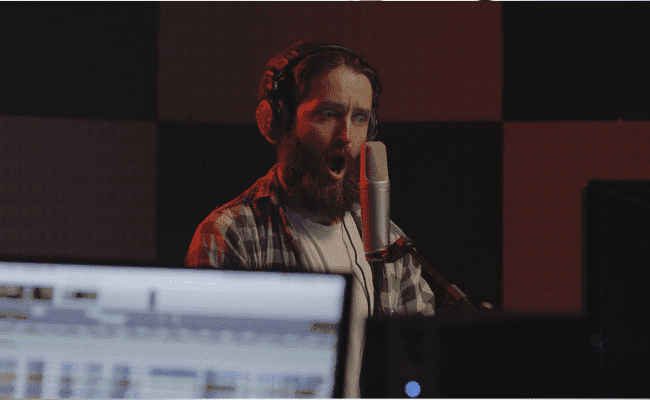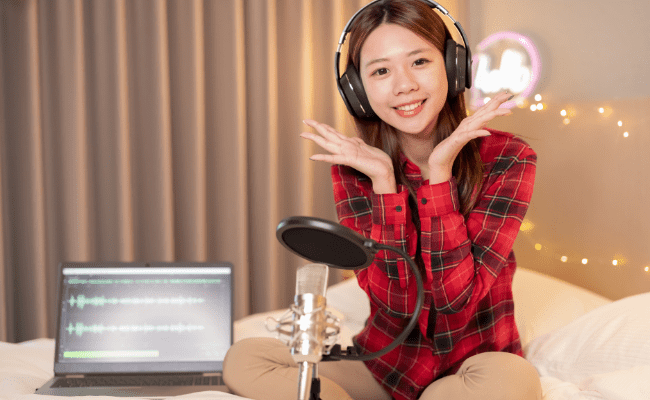No matter where you go or what you do, you’re bound to hear a voice over at some point in your day. They play out over the radio, on television, in movies, and even in theatres. If you plan to make your own voice over and want it to sound smooth, natural, and well-produced, you must get yourself a good pair of headphones.
Here are eight reasons why you need headphones for voice overs:
- They help you hear how you sound.
- They help preserve your voice.
- They help you hear how others sound.
- They can manipulate your voice.
- They help you hear distortions.
- They prevent fiddling and fidgeting.
- They keep the recording professional.
- They prevent embarrassment.
In this article, we’ll take a closer look into each one of these reasons why you need headphones for voice overs. You’ll learn how to enjoy the process, have an easier and faster time editing the recording, and end up with the best results that will be comfortable for your listeners to indulge in.

1. They Help You Hear How You Sound
Voice actors or actresses typically read voiceovers from a script. That can mean that only one person may be doing a voiceover or a few people. Voiceovers can get very intricate and creative.
A common problem and one that can turn listeners away is when the volume level of the voices doesn’t match up.
It’s very frustrating when you’re trying to listen to something you’re interested in, but you have to keep lowering or increasing the volume on your phone, radio, television, or computer because one person speaking is too quiet and the other is too loud.
If you record the voiceover without headphones, it’s unlikely that this issue will be picked up and corrected. However, since you can hear what the voiceover sounds like through your headphones, you’re able to adjust the volume issues by moving closer or further away from your mic, depending on whether you’re too soft or too loud.
Not only do headphones help you pick up and adjust your volume accordingly, but they make you aware of your pronunciation.
When talking in general, you may mumble over words or even pronounce some of them wrong without realizing it, or not until someone else points it out. With headphones on, you become aware of your voice and can catch those mumbles and mispronounced words.
As a voice actor or actress, your voice is your instrument. Instead of using a monitor as the musicians do on stage to hear their instruments and make sure it sounds good and to adjust the settings if it doesn’t, you need headphones to do the very same thing when you’re recording in the booth.
2. They Help Preserve Your Voice
If you’re recording in a professional booth, you’ll know what I mean when I say that it’s unnaturally quiet and can feel somewhat odd.
Audio or sound booths are soundproof and acoustically dead. They don’t let any sound in. Although it’s quiet in there, keeping the recording consistent and clear without interruptions from the environment around you is necessary.
As humans, we’re subconsciously used to hearing ambient noise and the way the sound of our voices bounces around a room. In a sound booth, this doesn’t happen. When you speak, your voice sounds absorbed and quieter than when you speak outside the booth. In a sound booth, you can’t trust your ears.
Due to your voice sounding much quieter in the booth, you’ll feel the need to talk louder, which isn’t necessary. Not only will the recording sound unsettling by your raised voice, but it’ll strain your voice. With headphones on, you can hear exactly what your voice sounds like, and you’ll talk at a comfortable volume, preserving your voice
and the eardrums of those who need to edit your recording.
If you find that hearing your voice while recording is too distracting for you or you battle to talk while hearing yourself talk back to you, then keep the headphones on one ear and off the other. In this way, you’ll still pick up on the technical issues and what your voice sounds like in real-time while being able to concentrate on what you’re reading and sounding natural.
If you’re just starting out in this career or hobby, try using headphones from the get-go, as this will help you get used to the feeling and the sound coming from them. They’ll save you a lot of time, effort, and frustration in the long run.
3. They Help You Hear How Others Sound
Many voice overs have more than one voice actor involved. Sometimes voice actors must speak simultaneously to bring about an effect, or they must speak directly after each other while bringing about a natural flow in the recording.
Headphones allow you to hear the other voice actor clearly. Hearing your script partner is necessary to create a natural flow when talking right after each other or at the same time. It also allows you to pause the recording promptly if your partner messed up or mispronounced a word without realizing it.
You’re both also able to position yourselves closer or further from the mic to balance your volume and prevent a see-saw of volumes within the recording, making it easier for the listener to tune into what you’re saying.
A few technical issues that occur far more than they should are when full voice overs have been recorded only for you to realize at the end that one of the mics wasn’t working, was at a different frequency or hadn’t been turned on at all.
If you’re both wearing headphones, you’ll both be aware of these issues as soon as you both start speaking, allowing you to quickly fix them and saving you both time and unnecessary effort.
4. They Can Manipulate Your Voice
If your partner is typically a very loud person and you’re typically a very quiet person, and you both battle to level out volume-wise, you can manipulate your voice through your headphones’ settings.
You can use a headphone amplifier to turn up the volume of your voice in your headphones. By turning it up, you’ll psychologically make yourself speak quieter so that you don’t hear yourself yelling in your ears.
Likewise, if you’re a very soft person, you should turn down the volume in your headphones, and you’ll naturally start speaking louder because you need to be able to hear yourself.
You can adjust the volume of your voice in your headphones by simply using headphones and an amplifier.

5. They Help You Hear Distortions
If you’ve recorded a few voice overs, you’ve most likely already experienced a bit of distortion, echo, or disturbance at some point within your recordings.
Distortion can happen as easily as brushing past your mic with your shirt, while echo can happen if you’ve been recording both your mic and system audio together.
If you’ve created your own makeshift booth, it’ll block out an adequate amount of environmental noise, but it might not be effective enough to block out all of it. If you’re recording in one of these, you may come across a few background disturbances in your recording.
You can avoid such interference from ruining your recording by wearing headphones. You’ll be able to hear clicks, buzzing, distortions, echoes, or background noises with headphones, whereas you wouldn’t pick these up without them.
As you hear these disturbances, you’re able to correct them, pause, restart the sentence, and then carry on, instead of hearing them all at the end and spending another hour re-recording the script in hopes that you won’t encounter them again on the second run.
6. They Prevent Fiddling and Fidgeting
It’s very easy to get engrossed in what you’re reading off of the script and start to rock back and forth, turn your head or get too far away from the microphone.
Inconsistent movement, however, will cause the volume to change or prevent the listener from hearing what you’re saying, which can become highly distracting for them. It may even cause the listeners to lose interest and find another audio to listen to instead.
By wearing headphones, you’ll become aware of your movement as you’ll hear your drift offs and your distant voice.
Headphones help you stay at the correct distance from the mic and axis. The proper speaking distance isn’t too close nor too far from the mic. This perfect position from the mic is often referred to as the “sweet spot.”
Without headphones, you’re unable to hear whether you’re in the sweet spot, and it’s challenging to predict where that proper distance is without hearing yourself speak, especially as a beginner.
If you’re a casual voice over artist in a makeshift recording booth that doesn’t keep too much sound out of it, headphones can cut out a lot of background noise that may distract you from the recording, making you sound more professional.
If you’re nervous, bored, or just a fiddler, wearing headphones is a must. It’s easy to start getting fidgety while doing a voice over, especially if it’s a long one. If you start touching the mic or running your fingers over it, your headphones will pick it up and stop you.
Something as simple as picking up and putting down your drink on the same table that your mic is on can send vibrations to your mic and create a distortion. Instead of going through a whole voice over while naively repeating this action, your headphones will pick it up straight away, and you won’t mess up your audio.
It’s better to pause at that moment and do a retake of the script’s line than only pick up the sound of your fingernail bumping or strumming the string on the microphone stand later on.
7. They Keep the Recording Professional
Although you should do any recording or production delivered to viewers professionally, it’s possible to lose the standard if you’re recording with friends or you’ve been recording for many hours.
An easy way to subconsciously keep people in work mode and on their highest level of focus and professionalism is to require them to wear headphones over their ears when recording.
By following this requirement, people subconsciously associate work time with headphones and break time or a more casual time with being headphone-free.
Headphones block out a fair amount of background noise, which helps focus and concentration, resulting in a better voice over product. They also prevent you from allowing your thoughts to wander off or go off-script.
8. They Prevent Embarrassment
I think there’s very little that’s more embarrassing than recording a voice over (or any audio for that matter) with several different people, wrapping up, saying goodbye, and then going to your recording and realizing that it’s full of distortions and varying volumes. Or finding out that one of the voice actors didn’t have their mic on. You either won’t be able to use the recording, or you’ll have to call them back for a retake.
A setup like this is very unprofessional and inconvenient. Instead of guesswork, invest in good headphones for the voice actors to use.
Headphones pick up errors in real-time, which allows you to fix them in real-time.
Without the proper equipment, your audio won’t sound smooth, natural, or well produced. No matter how hard or long you try to fix this in the editing process, it won’t sound as excellent as it could if the errors were picked up and adjusted in real-time.
Save yourself time and effort in editing and get some headphones.
The Best Headphones To Use for Voice Overs
Throughout this article, you’ve seen the benefits of headphones for voice overs. Here’s a list of the best headphones for your recordings available on Amazon.com.
These headphones are perfect for the sound booth, especially for a makeshift one that may not block out all sound. The Sony MDRV6 Studio Monitor Headphones cover your whole ear, reducing any environmental noises and helping you stay distraction-free.
- Connectivity Technology: Wired
- Neodymium magnets and 40mm drivers for powerful, detailed sound
- Over-ear design provides comfort and outstanding reduction of external noises
Last update on 2025-05-31 / Affiliate links / Images from Amazon Product Advertising API
These headphones are budget friendly, and a great pair to use, especially if you’re just getting started. They have good sound quality and will reveal any distortions, buzzing, echos or errors while recording. Their semi-open design is also excellent for sound quality.
- Around-ear Semi-open Headphones with Self-adjusting Headband and Detachable 10' Straight Cable and...
- Dynamic
Last update on 2025-05-31 / Affiliate links / Images from Amazon Product Advertising API
The beyerdynamic DT 770 PRO headphones are closed, over-ear headphones that sit securely over your head and prevent sound from escaping. It’s important for sound not to leak out of your headphones because then your microphone could pick it up, causing errors in your recording. These headphones are also durable and the cable is attached to only one side for your convenience.
- Closed over-ear headphones for professional mixing in the studio
- Perfect for studio recordings thanks to their pure and high-resolution sound
- The soft, circumaural and repalceable velour ear pads ensure high wearing comfort
Last update on 2025-05-31 / Affiliate links / Images from Amazon Product Advertising API
Sources
- YouTube: Do you need to wear headphones in the booth?
- Reddit: I know this might sound basic to some, but please wear headphones while you record. Here’s why…
- Reddit: Headphones while recording?
- Voquent: What are the Best Headphones for Voice-Over?
- Moonlighting Voice: Why do voice actors wear headphones?
Recent Posts
QuickTime is a vital app for many Mac users, and if you’ve recently bought a new microphone, you might wonder how to use it optimally. QuickTime cannot record audio content if it doesn’t have...
Every microphone leaves a unique signature on the quality of its output. If you’re a podcaster trying to melt your way into your audience’s hearts, a muddy, distorted recording won’t cut it....



